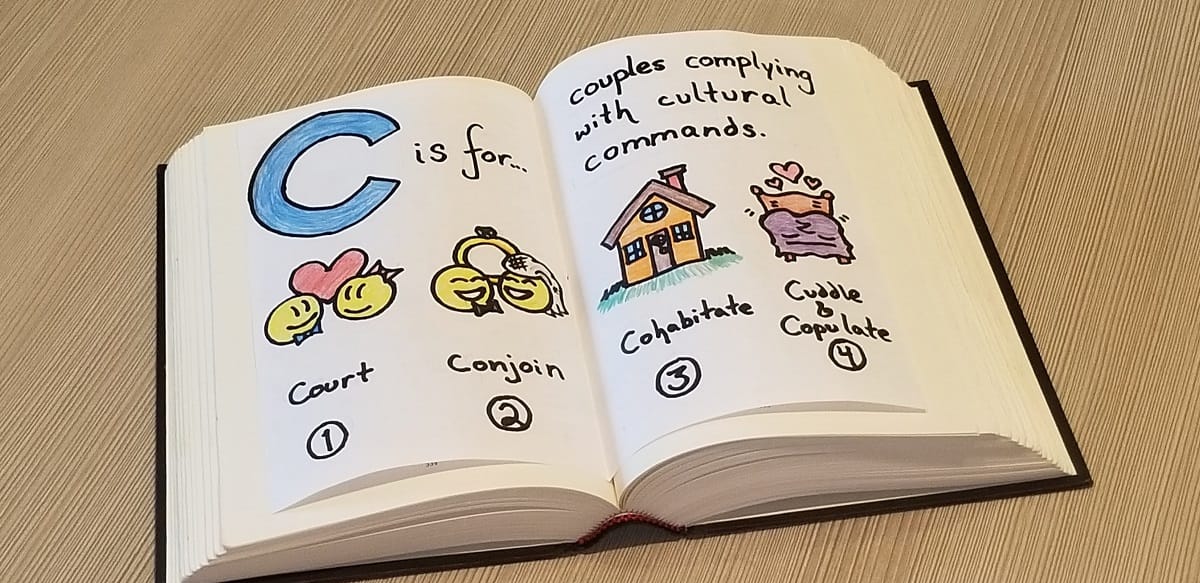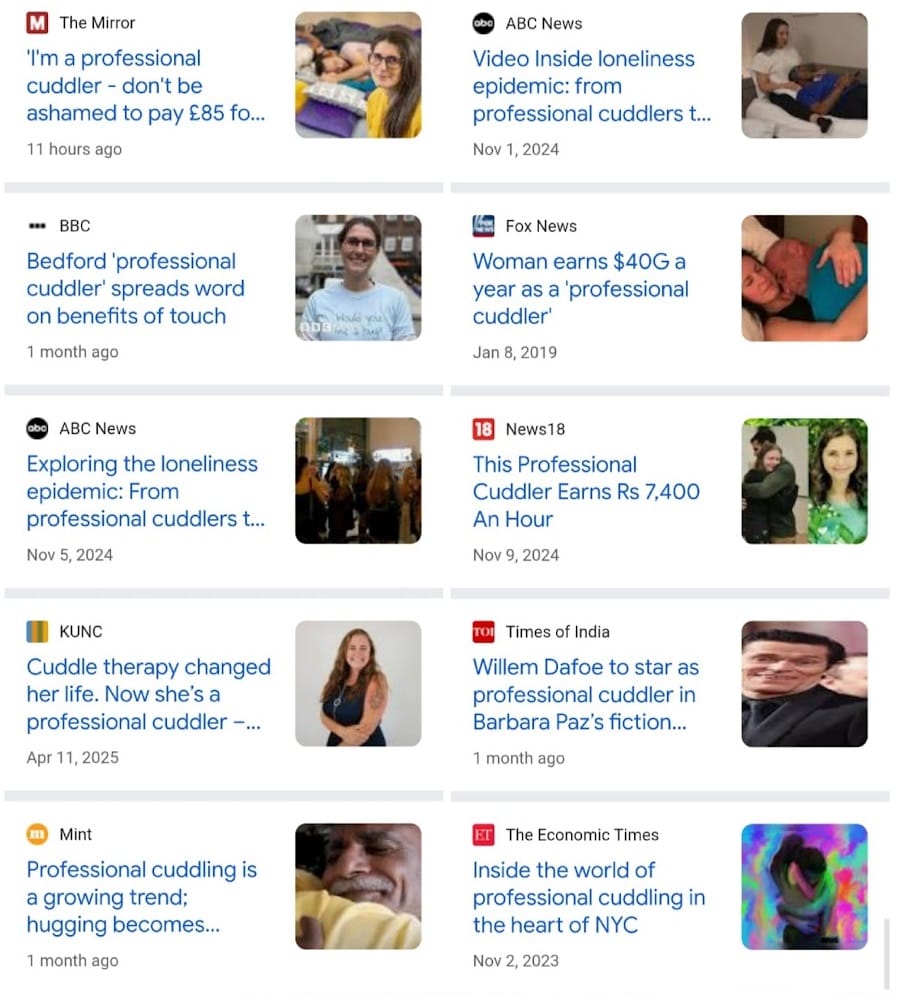
Intimacy as healing and activism: Cuddle control conditioning
Why we're starved for intimacy, and what can be done about it.
Sex in the future will be an increasingly prominent method for processing and addressing psychological needs, especially the emotional wounds inflicted upon us by adherents of fascist and capitalist ideologies, by fulfilling our needs for intimate connection and joy.
Last time on Sex in the Future, I alluded to the fact that many men want the bedroom to be a microcosm for all society, vis-a-vis the desire for dominance being the only acceptable attitude for male sexuality (Ancient Greece has joined the chat). This is not some “weird quirk” of patriarchy, it’s a consequence of patriarchy being a totalizing ideology. To function as such, the ideology must be represented and reified at every level and in every context, or it doesn’t work. Just as a great dam may be utterly undone by a single crack, the edifice of patriarchy must guard against any flaw or weakness in its hold on society. Even, and especially, in private.
Today, we’re zooming out to see how totalizing ideologies starve our reward centers to condition us into compliance with a system that does not serve us. We’ll start with a look at the growing field of professional cuddling. Next time, we’ll look at how reactionary backlash comes from a desire to force the world “back” into a shape it never truly was. Finally, we'll extrapolate forward and see some of what will have to be involved in dismantling that inhumane system from the bedroom out.
Intimacy for rent: Professional cuddlers
When I was in high school, I’d sometimes bring my dad’s copy of Newsweek to school after he was done with it, to discuss articles with friends and teachers. I got in the habit of doing this because when I didn’t have the article in my hand right that second, we’d get lost in the weeds on something we couldn't just refer to the article to clear up, and they’d usually be uninterested the next day.
Anyway, one week there was an article on a professional cuddler, and this was in the 1990s so I can’t even look it up to see what they said in the news back then. But I remember the conversations I had about it.
One of my guy friends thought it was a stupid idea and wouldn’t work, and I pointed out she was clearly doing business, and he rejoined that she got shut down (I think it was over prostitution allegations that she lacked the finances to fight, but again, it was the ‘90s). The fact that this did not reflect on the soundness of her business model was lost on him.
My churchy friend said that only couples should be cuddling because that’s still giving away part of your heart with intimacy, just like kissing doesn’t matter as much as sex but still matters. I didn’t agree that any form of intimacy “reduced” anyone’s value in any way, so we got nowhere. My history teacher thought it was a bad idea on account of the possibilities of sexual propositions and assaults, echoing and expanding on the politician's point that the allegations had to be investigated to rule out under-the-table prostitution.
But I can’t find the damn thing, so that’s my personal experience for the day. The unavoidable intrusion of AI into the once-simple act of Googling kept saying there is “not much news” on cuddle clubs and professional cuddlers in the ‘90s, and while it does repeatedly say the concept was initially met with skepticism and suspicion, that part isn’t linked to sources.
Then in 2016, Vice wrote a pair of articles about professional cuddling services. One dives into the very first professional cuddling service in the U.K., tangentially linking an Atlantic piece from December 2015 on the industry’s U.S. takeoff. The other, surprising no one, is an exhortation to Stop Trying to Have Sex with your Professional Cuddler, in which Travis Sigley, who founded the first (legally unassailed) professional cuddling service in the USA, points out that many cuddlemongers “are totally missing the point” by sexing up their advertising at the expense of clarity and honesty. The article cites some thoroughly mixed messaging, such as revealing photos paired with copy like “submissive,” juxtaposed with an FAQ that states “Think of this like making out with your girlfriend, only this is not your girlfriend, and no making out is allowed.” (How denotatively clear, in the most connotatively unhelpful way.)
Less than eighteen months later, in December 2018, the Daily Mail published a story about a Philadelphia-based professional cuddler making $56,000 a year. Fast-forwarding to the present day, professional cuddling services are even more in the news.

This market niche is starting to take off, and I expect that trend to continue, because it addresses a real need: the need for touch and intimacy. Finance bros, go nuts: the market is providing a solution!
So, why is the need for touch and intimacy so great? And why now—why isn’t this industry older than cars already?
Gatekeeping intimacy
The answer lies partly in my churchy friend’s insistence that nearly all physical intimacy ought to be between a wedded couple. The function of this attitude is to gatekeep the satisfaction of intimacy needs behind the artificial barrier of formally entering a (hopefully) productive marriage. In this way, a culture keeps its people maximally fecund (without crossing the line into an overt state-run breeding program) by instilling the attitude in folks that such affection is reserved for the thing that gets you breeding, and thus we are prodded to “seek our other half.” (Ancient Greece has joined the chat.) Our romantic feelings notwithstanding, the practical function is to treat the bulk of humanity like livestock, and keep workers in competition with each other over artificially scarce jobs by ensuring the labor supply exceeds its demand (a.k.a. “perpetual unemployment rate”).
But that pressure has been in place and working under patriarchy, in one form or another, since before capitalism—so again: why now?
Here we have another piece, the atomizing function of capitalism: hyper-individualist cultural messaging that one must rise through the ranks of Meritocracy Thunderdome with the clever application of bootstraps, or whatever’s handy. Cultivating a “go it alone” mindset isolates people from community, while the structural incentives of suburban sprawl and urban crowding facilitate the isolation of families and individuals from broader community. It didn’t come out of the gate like this, but with a century or so (depending when you start counting) for this societal architecture to do its work, we're now seeing this “new market niche” arise as a response to these influences playing out.
Of course, the aforementioned factors don’t completely cut people off from community. They’re more like “civilizational guardrails,” general attitudes of “how things ought to be” meant to help keep people on track. This is just one way how culture works. It’s not like people will line up to isolate ourselves from community—except here we run into another guardrail: class.
I mentioned in Femdom vs. Patriarchy that different social classes have different restrictions on their behavior. The upper class gets to be pretty uninhibited as long as they don't embarrass their peers too much, and nobody cares what the lower class does so they can be more authentic. But the middle class has to jockey for status to prove they aren’t lower-class and to try breaking into the upper class. One of the promises of capitalism is social mobility: with nothing but gumption and elbow grease, you too may rise above your station, as high as your individual merit can take you.
Thus, the enormous amount of human labor power required to drive the Industrial Revolution was achieved by luring the lower classes to attempt to work their way up through the middle classes, in the hopes of breaking into the upper crust of society. Along the way, this influx of labor competition would serve both to keep wages low by making it an employer’s market, and to reinforce cultural messaging by allowing cultural signifiers to be exchanged during the job assignment process (a.k.a. “putting your best foot forward for an interview”).
Henry Ford's English School is a literal historical example of how this process works. Ford didn't stop at standardizing manufacturing with the assembly line: he also wanted to standardize his workers. To that end, he expected his immigrant workforce to attend on-the-job classes where they were taught "how to be American"—which mainly consisted of speaking English and discarding their home country's language, dress, and cultural traditions. Ford's company also inspected workers' homes and personal lives to check if they were living up to what he deemed American ideals.
Under this model, folks compete for jobs not only on the basis of ability, but on the basis of cultural signifiers as well. Employers award opportunity and (more selectively) success to those who perform the best while also extolling cultural virtues. Like chastity (a.k.a. “loneliness on purpose”). Or work ethic (a.k.a. “internalized capitalist conditioning”).
Now we have in place a three-cycle societal reinforcement system: gatekeeping intimacy behind marriage, isolating individuals and families from community, and new sources of status competition, all working in tandem to slowly drive us apart and grind us down—unless we comply by getting married and having kids and climbing the corporate ladder and keeping up with the Joneses and so on and so forth. And once the poor think competing with each other to ascend is the only way to improve their lot in life, they don’t usually question the system within which all this class-dividing competition takes place, they tend to just do their level best. Exactly as instructed, like good little livestock.
The direct effect is worker alienation from worker interests, getting workers to aspire to join the exploiters, instead of dismantling the system of exploitation to create genuine worker ownership.
But as a side effect, yeah, we’re gonna need lots of cuddles! And some people are very upset by the ways many of us choose to acknowledge and address that need, which is where we’ll pick it up next time.
